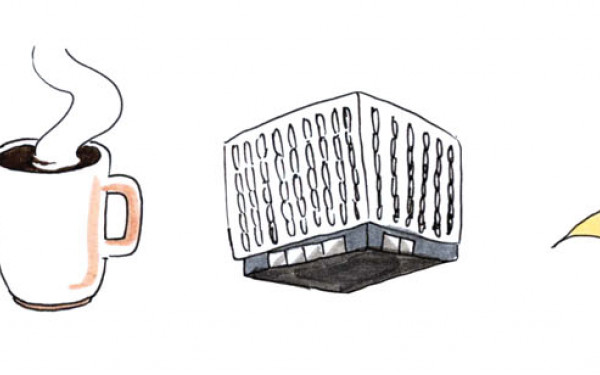No to Making Green, Yes to Being Green
Student Conference Concordia Transitions Discusses Ways to Improve Concordia’s Food System
Members of the Concordia Food Coalition, the Concordia Greenhouse and the Concordia Student Union agree: Concordia needs a new food system, one centred not on financial profits, but rather on being committed to providing affordable and healthy food. The only question is: how to make it possible?
That’s what the student groups set out to determine at a conference they organized on Saturday titled Concordia Transitions.
“I just think it’s really fantastic to see students working together on a [conference] like this,” said former CSU president Lex Gill, who facilitated the discussion at the conference alongside Erik Chevrier, who the CSU hired in October as a researcher and negotiator.
“Concordia has a really long history of rich, imaginative campus activism, and I feel like the work around food systems and sustainability that’s been going on over the last year or two in particular has been really good.”
The conference began and ended with urban agriculture. Curtis Stone, a farmer who founded Green City Acres in Kelowna, B.C., got the event started with a keynote speech. He explained how he originally envisioned saving enough money to buy his own land, but quickly realized that the price of land in British Columbia would make such an approach prohibitively expensive.
His solution: farming in people’s backyards, paying rent in fruits and vegetables. Every time Stone drops off produce at the restaurants he supplies, he collects buckets of vegetable trimmings to use as fertilizer. When he first started the business, he delivered the produce entirely by bike, sometimes towing as much as 180 kg of produce at once, thus reducing the carbon footprint of his farming.
His proximity to the community is effective marketing when your clientele is looking to buy local. Selling produce is easier when people can see for themselves how the food is being grown, he added.
“It doesn’t matter what political spectrum you’re on, everyone likes a garden,” said Stone.
Stone told the 100 participants in attendance that he wants to diversify and decentralize the food system. Instead of 10 massive corporate farms feeding a city, he says he would prefer hundreds of smaller farms serving local communities.
Ben Flanner, co-founder of Brooklyn Grange—a rooftop farm project in New York City—shared a similar approach in his own keynote speech. One of the project’s two farms is in a building with a café on the ground floor, from which the farm collects coffee grounds and vegetable trimmings to use as compost.
Both organizations look at waste management as resource management, and say they avoid whenever possible using industrial fertilizer which may contain harmful chemicals.
Concordia political sociology professor Satoshi Ikeda stressed the importance of eating organically during the CFC’s panel. He explained that as food is the primary determinant of a person’s health, bringing organic, non-GMO food to students should be a top priority.
Although Ikeda admitted it wouldn’t be possible to create enough food to feed all Concordia students through initial urban agriculture initiatives by the university, he added they could nonetheless serve a greater purpose.
“By creating many gardens, we would put pressure on the industry to change,” he said.
Concordia economist Marguerite Mendell spoke about the larger implications of urban agriculture and alternative economics.
“Rather than harvest food, I’d like to harvest some ideas,” she said.
According to Mendell, on a larger scale, Western economies must do away with the neoliberal model of laissez-faire, free market economics and instead embrace a more social and cooperative economic model. She told attendees of her experience at a meeting held by the European Commission, where the host declared it in the best interest of Europe to seek a new economic paradigm.
Espace/Vie/Emploi, an employment centre in Montreal, was praised by Mendell as the kind of inclusive institution that gets results.
Other institutions taking action on the issue of food sovereignty—such as the vegan soup kitchen the People’s Potato and the anti-capitalist grocery store Le Frigo Vert—echoed the economic need to level the playing field by subsidizing or paying entirely for healthy and sustainable meals.
After all of the speeches and panel discussions, conference attendees broke apart and participated in two-part discussion groups. During the first segment, they brainstormed broad responses to the question, “How do you go about developing a better food system at Concordia?”
Participants came up with answers such as “collective value shift,” “productivity” and “thinking of waste management as resource management.”
During the second part of the discussion period, attendees came up with more specific ideas on how to change the food system at Concordia. One group suggested a brewing and fermentation co-operative, where students would craft their own beer.
Another group said the current for-profit Java U café on the mezzanine of the Hall Building must be replaced—as it is currently expected to be—with a student co-operative when the company’s lease runs out. They said the new co-op should be supplied with food grown in the Concordia Greenhouse and urban agriculture initiatives at the Loyola Campus.
Before Java U took over the space in 1998, the second-floor housed the Mezz Café, a student-run endeavour that closed because it wasn’t profitable.

_900_599_90.jpg)
_600_832_s.png)

_600_375_90_s_c1.jpg)


